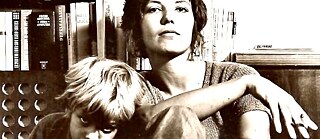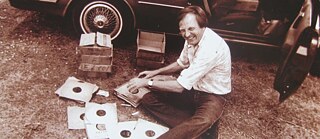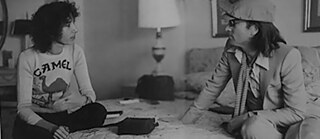Sibylle Baier’s Secret Music
Sacred Self
In her early 20s, Sibylle Baier recorded 14 folk songs that she says saved her life. Then, she packed the tape away and forgot about it. Decades later, her son discovered his mother’s music and released it — to critical acclaim. Sibylle tells her story for the first time to Carol McKinley.
Listen to this episode: Apple Music | Spotify | Download
This episode is by Carol McKinley, a journalist with over 40 years of experience. Carol grew up in Wiesbaden, Germany, in the ’70s and says that German culture is still one of her greatest passions. In 2018, she revisited Germany as a fellow of the RIAS Berlin Kommission. Nowadays, Carol lives in Colorado with her husband, her mom, and her French bulldog. In this episode, Carol interviews Sibylle Baier, a folk musician from Germany who resides in Massachusetts. For the first time, this incredibly private singer-songwriter tells her story to THE BIG PONDER. Sibylle’s son Robby Baier, a musician and music producer himself, and Andrew Rieger, co-owner of Orange Twin Records, recall the artist’s unexpected rise to cult fame. The music in this episode is by Sibylle Baier, courtesy of Robby Baier Music LLC. The photo for this episode shows a young Sibylle Baier with her son Robby and is from Robby Baier’s personal archives.
Transcript
Carol McKinley: What would you do if someone found that long-lost diary you forgot about and published it? Or how would you feel if that song you spilled your guts writing only for you showed up on Spotify for the world to hear?
[SONG — “I LOST SOMETHING IN THE HILLS” BY SIBYLLE BAIER]
This is the story of a folk music masterpiece never meant for public ears. In fact, the album Colour Green may have ended up in the trash [SOUND OF REELS SPINNING] if it weren’t for a curious son who discovered an ancient reel-to-reel spindle in a box, delicately threaded the old tape, and pushed play.
[SONG — “I LOST SOMETHING IN THE HILLS” BY SIBYLLE BAIER CONTINUES]
Carol McKinley: It’s this beautiful creation, but what was it to you?
Sibylle Baier: I think I had forgotten it. That people are drawn to this makes me feel hopeful for the world.
[SONG — “I LOST SOMETHING IN THE HILLS” BY SIBYLLE BAIER CONTINUES]
Carol McKinley: Ahead, Sibylle Baier, the shy folk singer with the devoted cult following breaks her silence for THE BIG PONDER. I’m Carol McKinley. And this is “Sibylle’s Sacred Self.”
[SONG — “I LOST SOMETHING IN THE HILLS” BY SIBYLLE BAIER CONTINUES]
Google Sibylle Baier, and you won’t find an interview. That’s how she wants it. I lucked out though — she decided I was okay upon spotting a cartoon-like painting of a mother bird on the wall over my shoulder during a Saturday morning Zoom. That’s when she opened up about her belated big break, which began as a surprise at her 60th birthday party in western Massachusetts.
Sibylle Baier: Right! My dear children threw me a birthday party at the legendary Dream Away Lodge [LAUGHS] in our neck of the woods, and their little friends were invited to do acts of juggling or dancing or poetry or anything as gifts, you know. And it was pretty wild ...
Robby Baier: It was awesome.
Sibylle Baier: It was so awesome ...
Carol McKinley: Awesome turned to awful when at the end of the night, Sibylle Baier’s well-meaning family sprung their surprise ... playing an intimate album she recorded during a painful time in her youth for all the guests to hear. Her son Robby remembers they then handed out copies of the recordings as party favors. The year: 2006.
Robby Baier: So, I basically edited the thing and mixed it and made this birthday CD. We can ask Sibylle before I think what happened, but I’m sure it wasn’t all positive: [CHUCKLES] Happy birthday, here’s 100 CDs that we’re giving to everyone! [LAUGHS]
Sibylle Baier: And then at the end of it, I had no idea this CD was being played. And you play it ...
[SONG — “COLOUR GREEN” BY SIBYLLE BAIER]
Sibylle Baier: And I am embarrassed, I’m livid, I’m angry. Why these old ... These old things of my life. And goodness and ah! And it was very uncomfortable. [BOTH CHUCKLE] And then, I had another drink and another drink and then I sang with them. And I danced with Michael the waltz, right?
Robby Baier: Mm-hmm. You did that.
Sibylle Baier: And I danced with my husband.
Robby Baier: And you sang one too.
Sibylle Baier: Yes, and we sang one too, so finally I calmed down. But I was ... Is that how you felt it too?
Robby Baier: Yeah, it was like, you know, you were kind of, yes, embarrassed and shocked but also then tickled. And kind of ... And I think the joy came actually later when she started realizing ... ’Cause, you know, all these people in the community had it, and she was getting all this feedback of how awesome it was and how people were moved by it. And how, you know ... So it was like shock and then later the kind of being okay with it.
Carol McKinley: Sibylle’s musical revival might have been short-lived ... Except for one guest at the birthday party who was blown away. Jay Mascis is a singer-songwriter for the alternative rock band Dinosaur Jr. He shared that CD with a friend with a record label in Athens, Georgia.
Andrew Rieger: Alright. Hi, I’m Andrew Rieger, and I am a co-owner of Orange Twin Records. And I also have played in a band called Elf Power since the mid-1990s, and so I’m here to tell you a little bit about how I first encountered the Sibylle Baier Colour Green album and how we came to put it out on our label. Yeah, it was kind of ... went from Robby to Jay to us.
[SONG — “I LOST SOMETHING IN THE HILLS” BY SIBYLLE BAIER]
Andrew Rieger: And we were actually — my band was on tour, and we were staying at Jay’s house in Amherst, Massachusetts, and I just remember waking up and hearing this music ... And it was playing because he was making coffee for us and just being like mesmerized by it.
Carol McKinley: What was it that made you decide not to add a bunch of background instrumentals and other voices? Was there a discussion about how to release it?
Andrew Rieger: It would kind of feel sacrilegious to augment it with a bunch of modern overdubs. I think it would sound weird.
Carol McKinley: And just like that — Sibylle Baier’s intimate soundtrack sung for no one became an overnight success. The album Colour Green only took 33 years to surface.
Andrew Rieger: She was completely unknown in 2006, and so, you know, we pressed up a bunch of records and a bunch of CDs. And I mean, yeah, there have been albums by artists that we’ve done that for and nobody’s really bought them and we’ve lost money. But, you know, that’s kind of the risk that you take running a label. And if you love music, you know, an album, enough and really believe in it, then you just kind of take that risk, so ...
Carol McKinley: And why did you believe in her?
Andrew Rieger: The songs to me are just amazing, you know. I feel like she’s really good at kind of balancing these really emotionally complex and dark songs and then balancing that with like these other songs that are just a slice of life, of her family life, where she’s talking about taking her kids to the zoo and cooking dinner and going to work and having the cat sit on her lap. And I just think it’s really unique in that way.
[SONG — “SOFTLY” BY SIBYLLE BAIER]
Carol McKinley: Today, 15 years after that cringe-worthy birthday party reveal, critics compare Sibylle’s style to Leonard Cohen, Phoebe Bridgers, and Joni Mitchell. Her admirers include Lee Ranaldo of Sonic Youth and the actor Elliot Page.
[SONG — “I LOST SOMETHING IN THE HILLS” BY SIBYLLE BAIER]
To understand this story you must go back fifty years — to Stuttgart, Germany, in the early 1970s when the young actress and mother recorded 14 songs.
[SONG — “I LOST SOMETHING IN THE HILLS” BY SIBYLLE BAIER CONTINUES]
Carol McKinley: [SINGING] I lost something in the hills. What’s that about?
Sibylle Baier: I wish I knew. I don’t know what I lost. Ah ... You know what comes to me? I think. I hope. Maybe it was a prayer for, I lost myself. Finally, I lost myself.
Carol McKinley: At night while her family slept, Sibylle Baier made music with her rich alto and acoustic guitar. You’re in the moment with Sibylle, 50 years ago as she practiced by the light of the moon. This eventually became the song “Tonight.”
[SONG — “TONIGHT” BY SIBYLLE BAIER]
Sibylle Baier: So, he had a good — this piece of good equipment for recording, so I could use that. And I propped it up, I propped the microphone, I think, right, Robby? I propped it up on a few books and figured out how this would work best and I would sit and record many times a song.
[SONG — “FORGET ABOUT” BY SIBYLLE BAIER]
Robby Baier: Yeah, it’s in my DNA, those songs.
[SONG — “FORGET ABOUT” BY SIBYLLE BAIER CONTINUES]
Carol McKinley: But after several years of intense creative songwriting, she packed the evidence of her heartache in a box and forgot about it ...
[SONG — “FORGET ABOUT” BY SIBYLLE BAIER CONTINUES]
Carol McKinley: ... except for four single cassettes, Sibylle’s late husband Michael made and saved. He kept one to play at home and then he passed those other three to close friends, including celebrated German filmmaker Wim Wenders — he might be best known in America for his film Paris, Texas. Michael, also a film producer, died in 2020.
Robby Baier: My dad was, you know, also a musician. He was a saxophone player and flute player when he was, you know, 18, 19. And played in bands and, you know, wrote some songs on piano. He was, you know, a very musical person ... loved music so much.
Sibylle Baier: I think he would have enjoyed it if I would have made a career out of it more. Or something, right? You think, Robby?
Robby Baier: Definitely. I mean, he was a music lover and he heard how good the music was and how unusual it was. How beautiful her voice was. And of course, you know, there were often people around the house — musicians, artists, and filmmakers ... And it was ... You know, often the guitars would come out. And people would play and these songs would come out, and people would love them. So, they were just kind of locked in this kind of ... at our house. They never left our house, right?
Carol McKinley: Locked in the house — until one day, an influential friend heard Sibylle’s music playing during a phone call.
[SONG — “FORGET ABOUT” BY SIBYLLE BAIER]
Sibylle Baier: A filmmaker, a friend, called and said, “What’s playing in the background? I want to hear this music.” He was in Stuttgart the next day!
[SONG — “FORGET ABOUT” BY SIBYLLE BAIER CONTINUES]
Sibylle Baier: And so, Hans Geißendörfer came the next day and wanted to make a TV show and said: You must go on the road! And Virgin Records and, you know, the whole nine yards. And I had no idea about what’s going on in the world. Or music world or folk world or something like that. And our friend said, “I’m not touching it! You have everything on it! The baseline is on there. Everything. The harmonies. It needs nothing.” And then I said, well, I can’t do this alone, so no thank you.
Carol McKinley: So there were no lights or stage, no bowls of chosen M&Ms for her dressing room.
Sibylle Baier: So, it didn’t happen. And I didn’t really want to do that either. I think our lives were very full already.
Carol McKinley: Sibylle’s star, never born, but ... Three decades after her music was retired — and the family had long since relocated, making the move from Germany to the United States — Robby, now an adult, discovered the music in a box of family stuff.
Robby Baier: And then, I went up and found the reels. I went into the attic, found the reels. And I have a recording studio. Then, I was like, what’s on these reels?
Carol McKinley: On the reels, Robby recognized the low, soothing voice of his mother.
[SONG — “SOFTLY” BY SIBYLLE BAIER]
Carol McKinley: By this time, he was a professional music producer, and he was electrified by the honesty of her long-lost recordings.
[SONG — “SOFTLY” BY SIBYLLE BAIER CONTINUES]
Robby Baier: These songs do stand the test of time. They’re not just, you know, the ramblings of a young, confused woman. They’re actually, you know, it’s ... They’re very deep, and they’re timeless.
Carol McKinley: For the second time, Sibylle turned down record deals and concert tours. Orange Twin has sold out numerous CD and LP pressings. Can you imagine the pressure she must have felt to produce an encore to the music she created in what was basically another lifetime?
Robby Baier: The way I remember her feelings about the album was — how these people listening — what do they actually see in these kind of like, you know ... not rantings but ... Is this just like some depressed 20-year-old? Because so much time had passed for her, you know? She felt like, who is this person that was this? But in a way, what more needs to be said, right?
Sibylle Baier: Right, that’s what I mean, yeah. You know, why have five more albums?
Carol McKinley: Today, a growing number of Sibylle’s worshippers want more from the reclusive poet-songwriter who never played a single gig.
Andrew Rieger: That is intriguing to people about her ... is that there’s not that much information, and she’s not going on Instagram and putting pictures of what she ate for lunch every day. Nobody knows that much about her and that just kind of adds to the mystery, I think.
[SONG — “I LOST SOMETHING IN THE HILLS” BY SIBYLLE BAIER]
Carol McKinley: You know, you think about what you kept away from the world for 30 years ... And then, it suddenly was out on your 60th birthday. It’s like someone saw your innermost self. It’s scary.
Sibylle Baier: Well, it’s also sacred space kind of, I feel. You know, where you’re seen or heard is always a sacred space.
[SONG — “REMEMBER THE DAY” BY SIBYLLE BAIER]
Carol McKinley: In her rare interview with THE BIG PONDER, Sibylle describes what led to her very first song, “Remember the Day,” which she wrote during those nighttime serenade sessions from 1970 to 1973 during a gloomy winter moment.
Sibylle Baier: It’s myself in a painful February mood. You know, many young people, many people, have dark stretches ... And that was a specific or especially dark stretch.
[SONG — “REMEMBER THE DAY” BY SIBYLLE BAIER CONTINUES]
Carol McKinley: To get her out of her funk, a friend proposed a road trip to buy food for her mother’s restaurant, which was in a train station of a cog car.
Sibylle Baier: And she came by that morning and said, oh come on, come with me. And pulled me, so to speak, from under the bed. That’s how I felt. And I finally agreed and said, okay, I’ll come. And we drove to Strasbourg and first had lunch in the Renard, which is ‘the fox,’ ‘the red fox.’ I remember that. And truthfully, first she goes to the bathroom and then I go to the bathroom and then we come back together and say, do you think what I thought? And I said, yeah, let’s go across the Alps! I have no idea where that came from, but youth is that way. You know, it’s wonderful. Or it’s probably still that way, but we’re not open to it.
Carol McKinley: After getting lost in fog, a morning on the beach, and a run-in with some German police officers who thought the flowers in their trunk were marijuana, Sibylle returned from the road trip refreshed but shaken at the choice she almost made.
Sibylle Baier: And I came home and I say, what happened? How can you be going from how to get rid of yourself without committing suicide, kind of, to all is good. And then, this song fell out.
[SONG — “REMEMBER THE DAY” BY SIBYLLE BAIER]
Sibylle Baier: I think the same day or next day.
Carol McKinley: Just fell out, huh?
Sibylle Baier: Just fell out, yeah. Because I said, Sibylle, you have to remember this day. Please, remember this day.
Carol McKinley: And have you remembered the day through the years? Have you thought about that day?
Sibylle Baier: Not often enough. And Robby sometimes reminds me. I think you said, Robby, that’s your favorite song, right?
Robby Baier: Mm-hmm.
Carol McKinley: Robby manages her website, fielding notes from listeners as far away as Montenegro, Argentina, China, New Zealand. Her aching lyrics have inspired some fans to become musicians themselves. A few have named their children after her.
Sibylle Baier: The bombing of Syria and the escape from it, you know. It was always that certain songs move certain people. Or now, one came, it got me through the grief of losing my father. This is now, I feel a little unsettled about it all. And maybe that’s why it’s resonating, still. Or, you know, as opposed to: I have a plan, I wanna make a song, and I want to conquer something.
[RECORDING OF SIBYLLE COMPOSING THE SONG “GILBERT”]
Carol McKinley: You’re hearing Sibylle actually composing a song called “Gilbert” from that original attic recording, using an unorthodox songwriting technique.
Robby Baier: She’s literally writing the song, like moments. She’s like in the moment and like she says, she feels something and maybe there’s a word or an idea and she sings it. And then, she listens to where that wants to go. And then, both the music and the melody and the words kind of move together in this way until the song is finished.
Sibylle Baier: It’s different for different people. I think some write lyrics first, and then try to find music. Or bits by bits. Or for me, it came out almost at the same time. Because it’s so much in there that it leads you by itself. It’s a sense of ... ah, this feeling or this word, this sound even, [SINGING] wants go there. Or, you know ... Ah and then, it feels right, somehow.
Carol McKinley: Which song were you just singing? Was that one of your songs?
Sibylle Baier: No, that was just a moment.
Carol McKinley: Oh, I see!
[SIBYLLE CHUCKLES]
Robby Baier: That was a song, just for you right there.
Carol McKinley: Wow, I’m so privileged. Robby, you decided to come out with a song book for your mom.
Robby Baier: Mm-hmm.
Carol McKinley: Tell me about why you did that.
Robby Baier: I, as a musician, you know ... Many people have covered her music, and you can find Youtube videos of covers ... And it always drives me crazy when they play it quote unquote “wrong,” you know. They play it with the wrong chords, and they don’t have, you know, they don’t have the right voicings. So I just, I cared enough about it to have at least the people, you know, who want to learn it the right way ... That they can, you know. Without having to spend hours and hours like I did figuring it out.
Carol McKinley: Sibylle, how does it make you feel to hear that?
Sibylle Baier: I am in tears ... Robby’s songs that ... He wrote, he wrote them when he was 12 years old. They are my favorite songs. You should listen to them. I’m serious!
[SIBYLLE AND ROBBY SINGING: OH LOOK IN THE WATER ... OH LOOK IN THE WATER ... ]
Robby Baier: You don’t remember the lyrics, Mom? I’m offended.
Sibylle Baier: Help me!
[RECORDING OF ROBBY’S SONG “BEGINNER”]
Carol McKinley: And by request, ladies and gentlemen — dug from the Baier family archives — this is the song “Beginner,” written and sung by Robby when he was 12, a few years before the family left Germany for the U.S.
[RECORDING OF ROBBY’S SONG “BEGINNER” CONTINUES]
Sibylle Baier: It’s just wonderful.
[ROBBY LAUGHS]
Carol McKinley: Robby has his own career producing music for commercials, film, and TV, recently launching his second album — it’s called Making Space.
[SONG — “MAKING SPACE” BY ROBBY BAIER]
Carol McKinley: But his mother’s music, even though it was released back in 2006, still eclipses his.
Sibylle Baier: I never did this on purpose, you know. It was just what was right that day.
Carol McKinley: Did you write your lyrics down and read from lyrics when you were singing? Or did that come from inside as well?
Sibylle Baier: Well, I did write them down in little school notebooks. Together with notes, shopping lists, and phone numbers and all that, right? And then, cigarette burns and so on ... Because it was usually in the evenings.
Robby Baier: Cat hair.
Sibylle Baier: Cat hair. [LAUGHS] Part of life! And that happened at night in my bedroom. So yes, I wrote them down, and many of them fell out just as they were. I was looking for rhymes. That is true, sometimes. Because it was the English language ... I love languages. So, it was a joy for me to find what would rhyme with this ... Aha! And then, a rhyme like that opens a whole universe, just a ... Yes, a new world ... Yes ...
[SONG — “COLOUR GREEN” BY SIBYLLE BAIER]
Carol McKinley: Can we talk about the “Colour Green” for a minute? It’s about a green sweater, but it’s not about a green sweater.
Sibylle Baier: I wasn’t thinking; I was knitting a sweater.
Carol McKinley: It’s almost like you’re having a conversation with someone and ...
Sibylle Baier: Well, that’s what it was. The album’s title song, “Colour Green,” is actually an homage to Wanderlust.
[SONG — “COLOUR GREEN” BY SIBYLLE BAIER]
Carol McKinley: After World War II, many young Germans like Sibylle were curious about the United States.
Sibylle Baier: Germany was divided into four parts after the war by occupiers, and we grew up in the American zone. So, we had the GIs there occupy our parents’ homes and so on. America at that time and the American literature and the jazz music and rock and roll ... America was a heroic land for us back then.
Carol McKinley: In 1981, Sibylle and her family did move from Germany to western Massachusetts, which looks like a place she only imagined when she recorded those lyrics way back in post-’60s Germany.
Sibylle Baier: Later on, I realized that it was prophetic. Because there is, I think a stretch of lyrics that says, “I know farther west these hills exist, marked by apple trees, marked by a straight brook that leads me to wherever I wanted to.”
[SONG — “I LOST SOMETHING IN THE HILLS”: OH I KNOW FURTHER WEST, THESE HILLS EXIST, MARKED BY APPLE TREES MARKED BY A STRAIGHT BROOK ... THAT LEADS ME WHEREVER I WANTED TO ... ]
Sibylle Baier: That this happened, we moved to the U.S, and it was into a landscape with apple trees and the woods and a straight brook and all that, many years later.
[BERKSHIRE LYRIC CHOIR SINGING “THE HEAVENS ARE TELLING” BY JOSEPH HAYDN]
Carol McKinley: Today, Sibylle’s voice is one of 80 in her local community choir, it’s called the Berkshire Lyric.
[BERKSHIRE LYRIC CHOIR SINGING “THE HEAVENS ARE TELLING” BY JOSEPH HAYDN CONTINUES]
Sibylle Baier: We’re all lucky to be together, and they still do this every three weeks online together. Just warm ups. Yeah, you can’t sing together, but then you listen to a piece like the Brahms Requiem, or something, and you can sing your part.
Carol McKinley: Do you play a guitar while they’re doing it or do you play any instruments for ’em?
Sibylle Baier: No, no, no, no. This is all ... No, no, and they ... They don’t know about my youth.
Carol McKinley: Oh, they don’t? How interesting!
Sibylle Baier: Most people don’t. Thankfully. And I don’t either.
Carol McKinley: That’s how you want it?
Sibylle Baier: Well no, it’s how it is ... I don’t want anything about it. I keep forgetting it because life has been rather full, you know ... And then, oh, that’s right!
Carol McKinley: Sibylle never copied anyone and doesn’t follow popular music, so don’t try and have a conversation with her about current folk singers. When I think about the singer-songwriters today ... I love Tracy Chapman. I don’t know if you know who that is. Do you know who Tracy Chapman is?
Sibylle Baier: No, I don’t. And I’ll write it down.
Robby Baier: She won’t know anybody that you say.
[SONG — “REMEMBER THE DAY” BY SIBYLLE BAIER]
Carol McKinley: Sibylle pressed pause on her music for half a century. But in just the past year, she’s seen a lot of change: She lost her husband, she’s been isolated during the pandemic, and the clock ticks. She feels like now she has something to say.
Sibylle Baier: I would like to write a song, at least one, that ... There’s one that’s called, it’s T.S. Eliot, “I grow old and I shall wear the bottom of my trousers rolled.” Right? This is on a record. I would like to write one, and it would start probably with the same chords, “Now I’m old. I do wear the bottom of my trousers rolled. And I wade in the water, and the far shore is near.” Oh you know, so I would like to write about old age or dying or, you know, those things.
[SONG — “REMEMBER THE DAY” BY SIBYLLE BAIER]
Carol McKinley: To us, it’s amazing that you were able to put something like this away. If Robby hadn’t have found it — it would have been still in the attic.
Sibylle Baier: Yeah! It would be okay with me, as I said before. I’m now feeling uplifted by the fact that people are attracted to it because it makes me hopeful. The sacredness is rather the people who listen to it. A place where people listen and receive you, that is a sacred space, I think.
[SONG — “REMEMBER THE DAY” BY SIBYLLE BAIER]
Carol McKinley: For THE BIG PONDER, I’m Carol McKinley.







